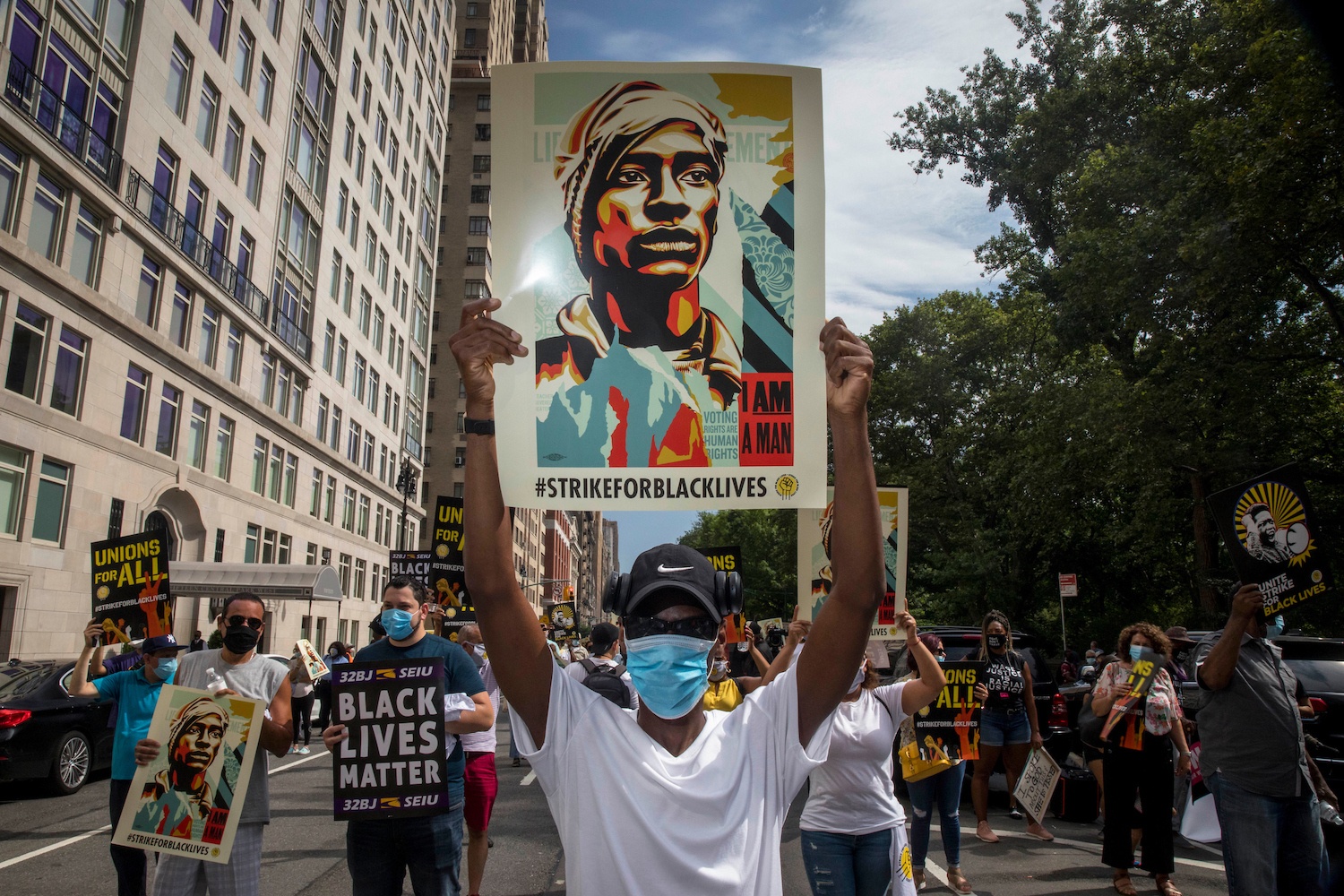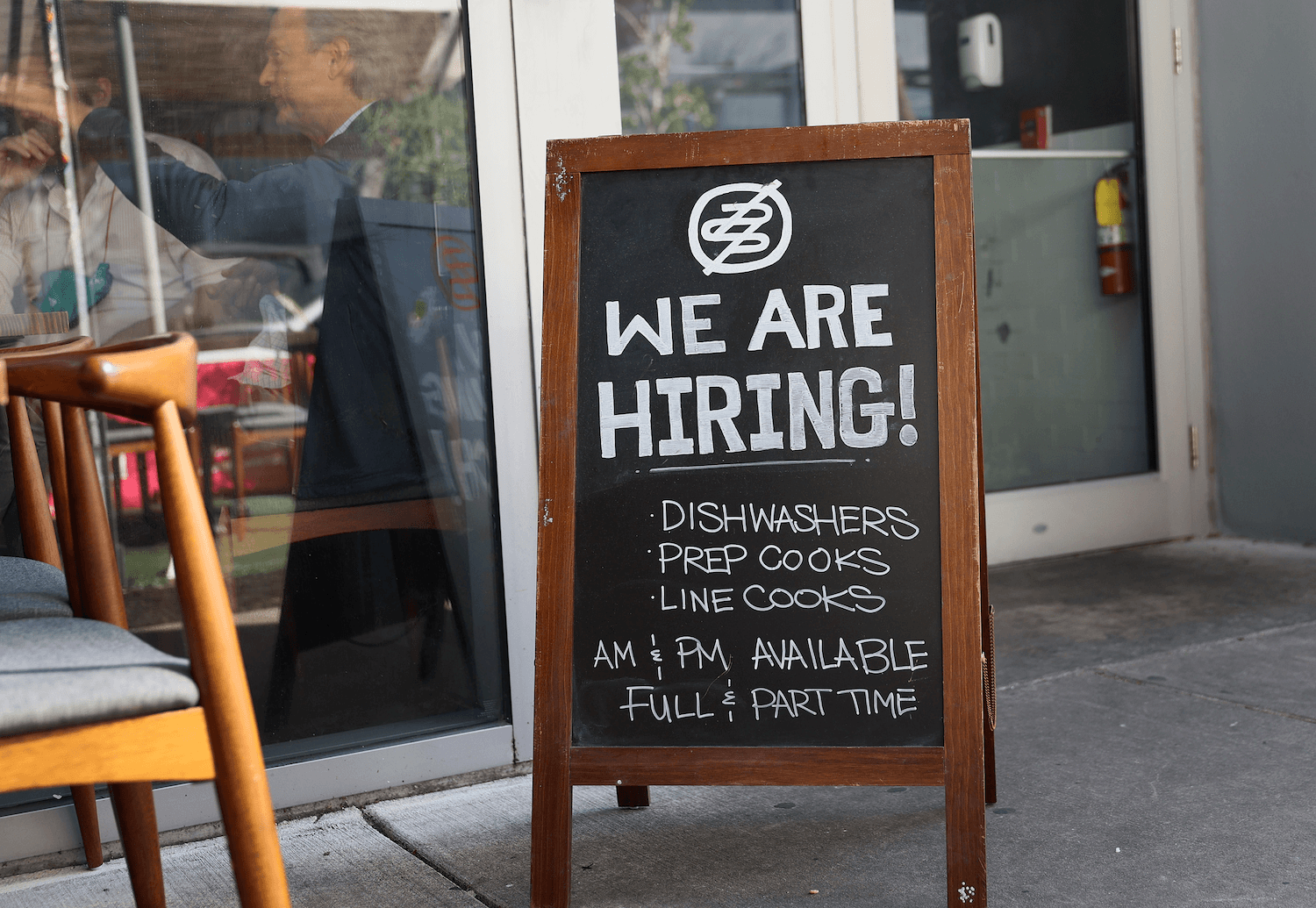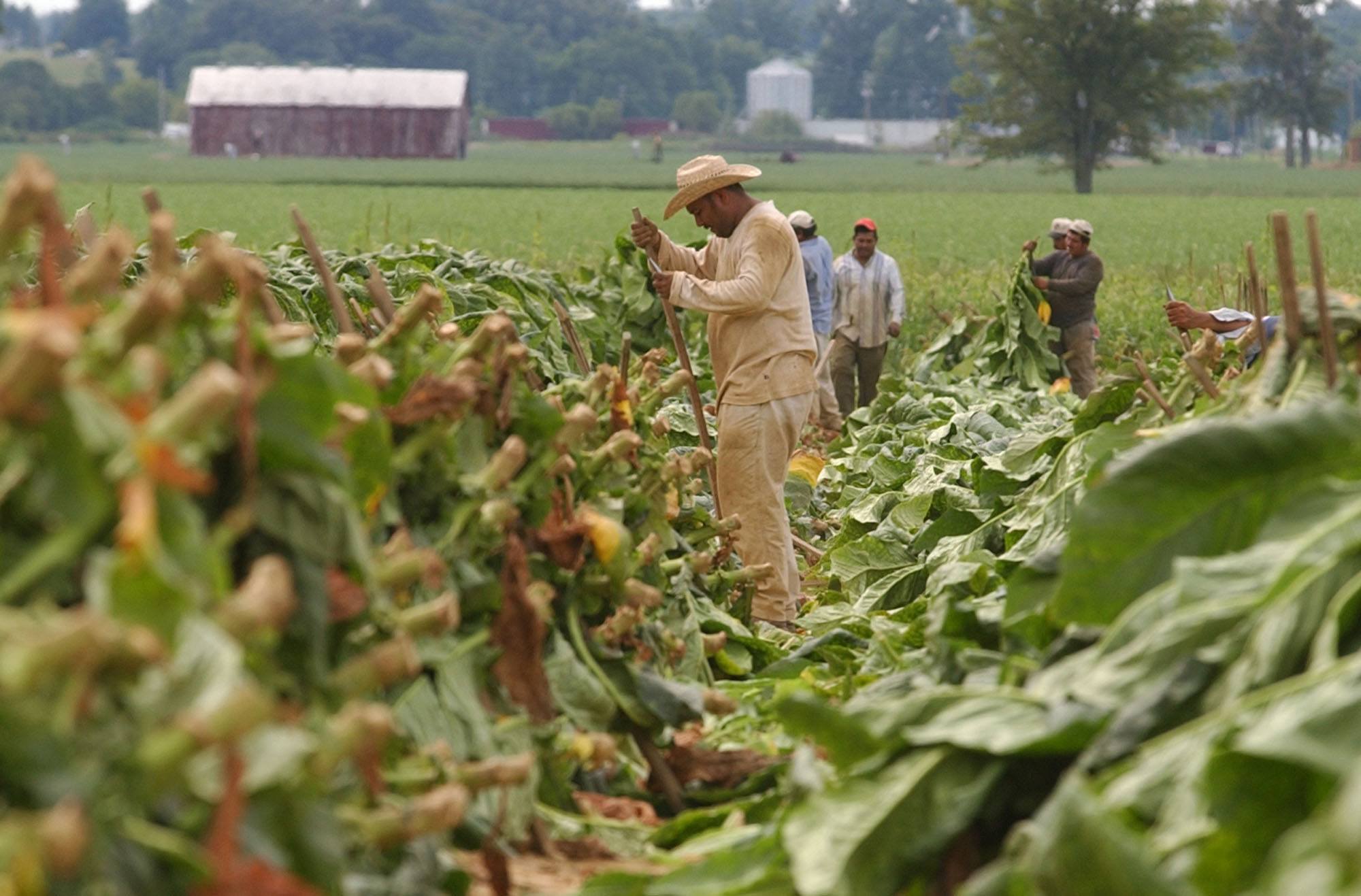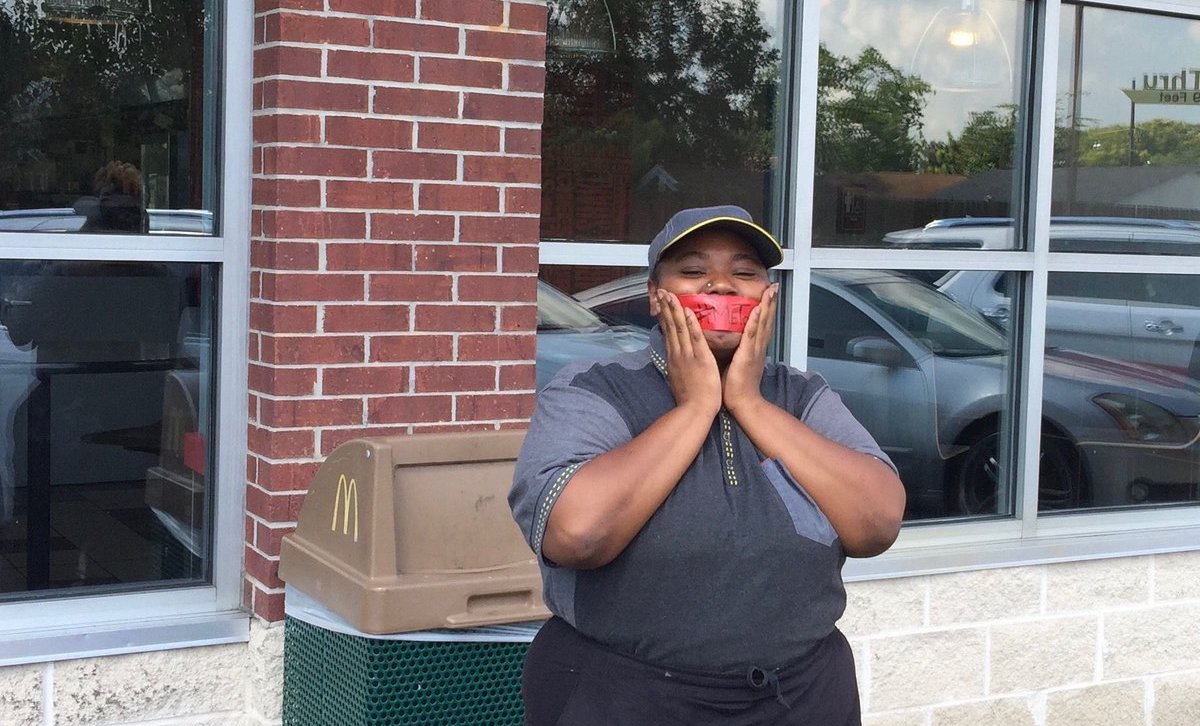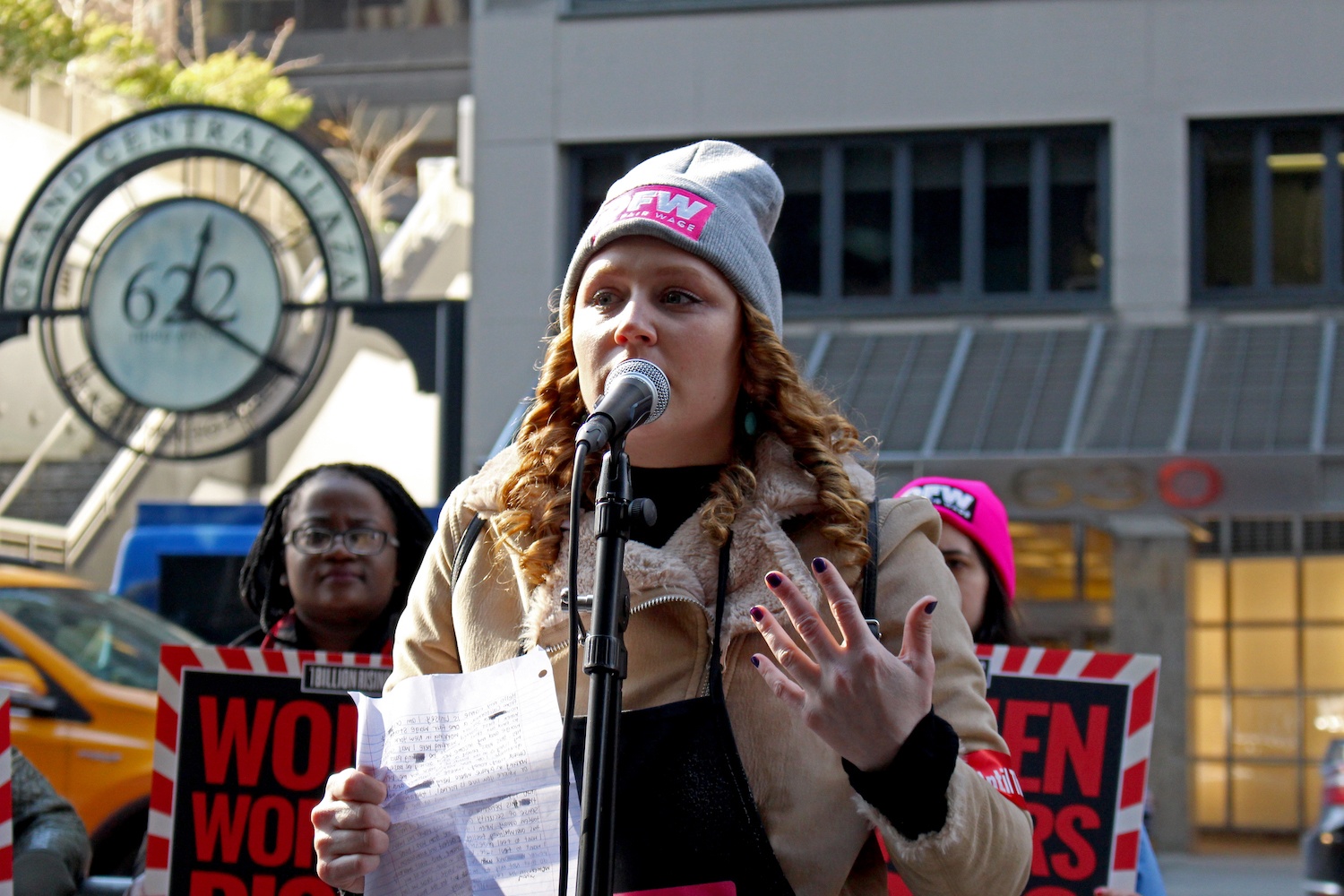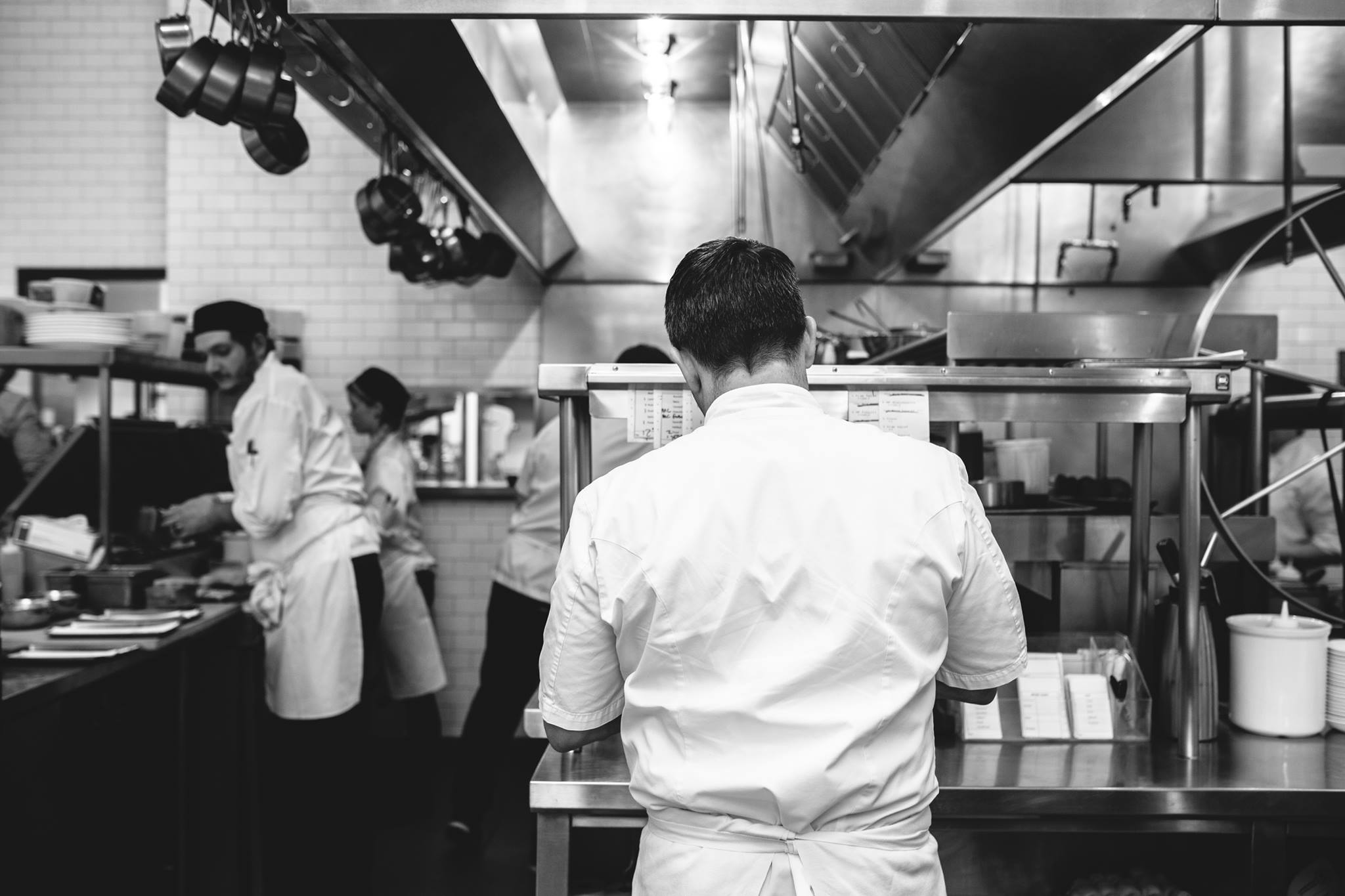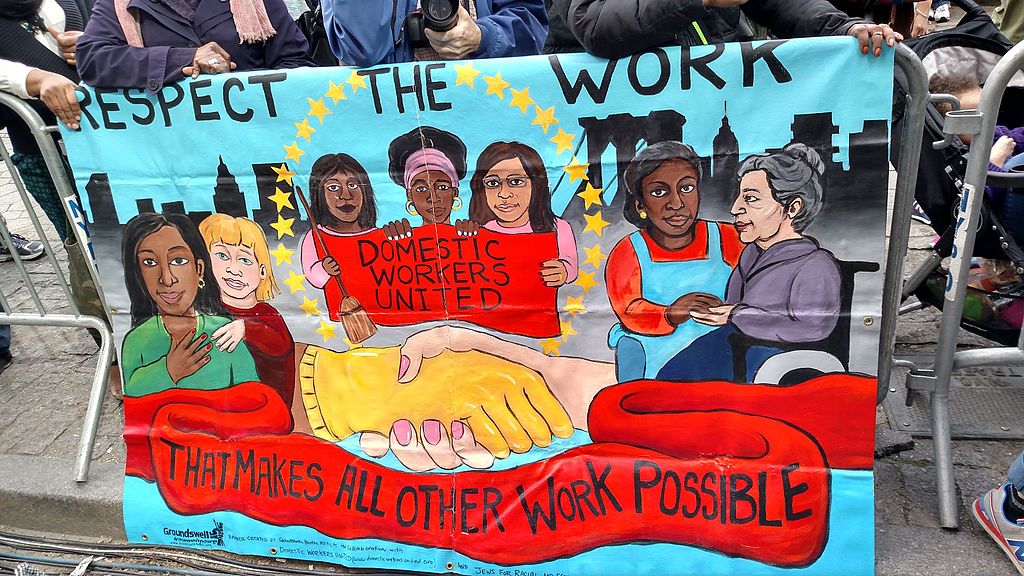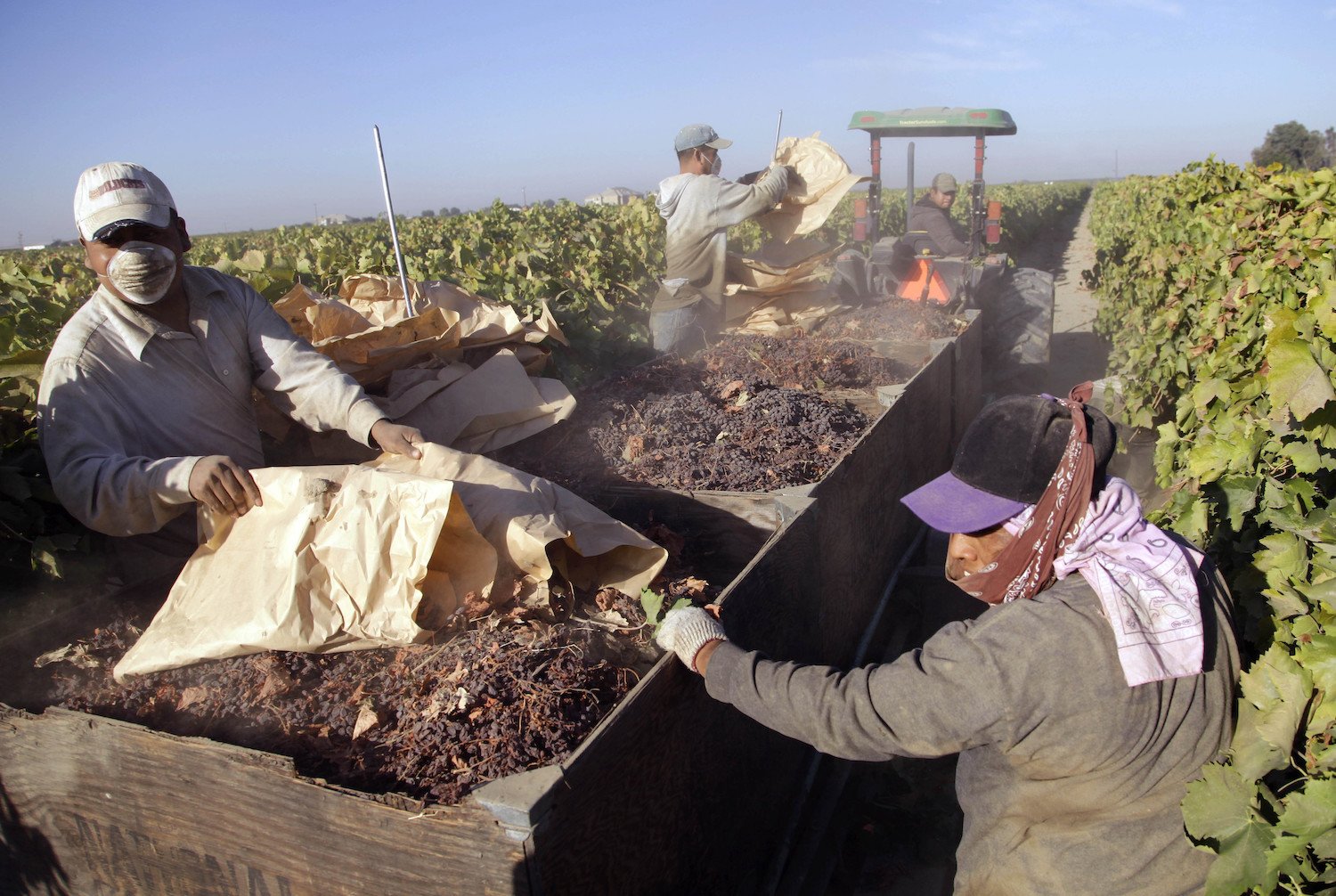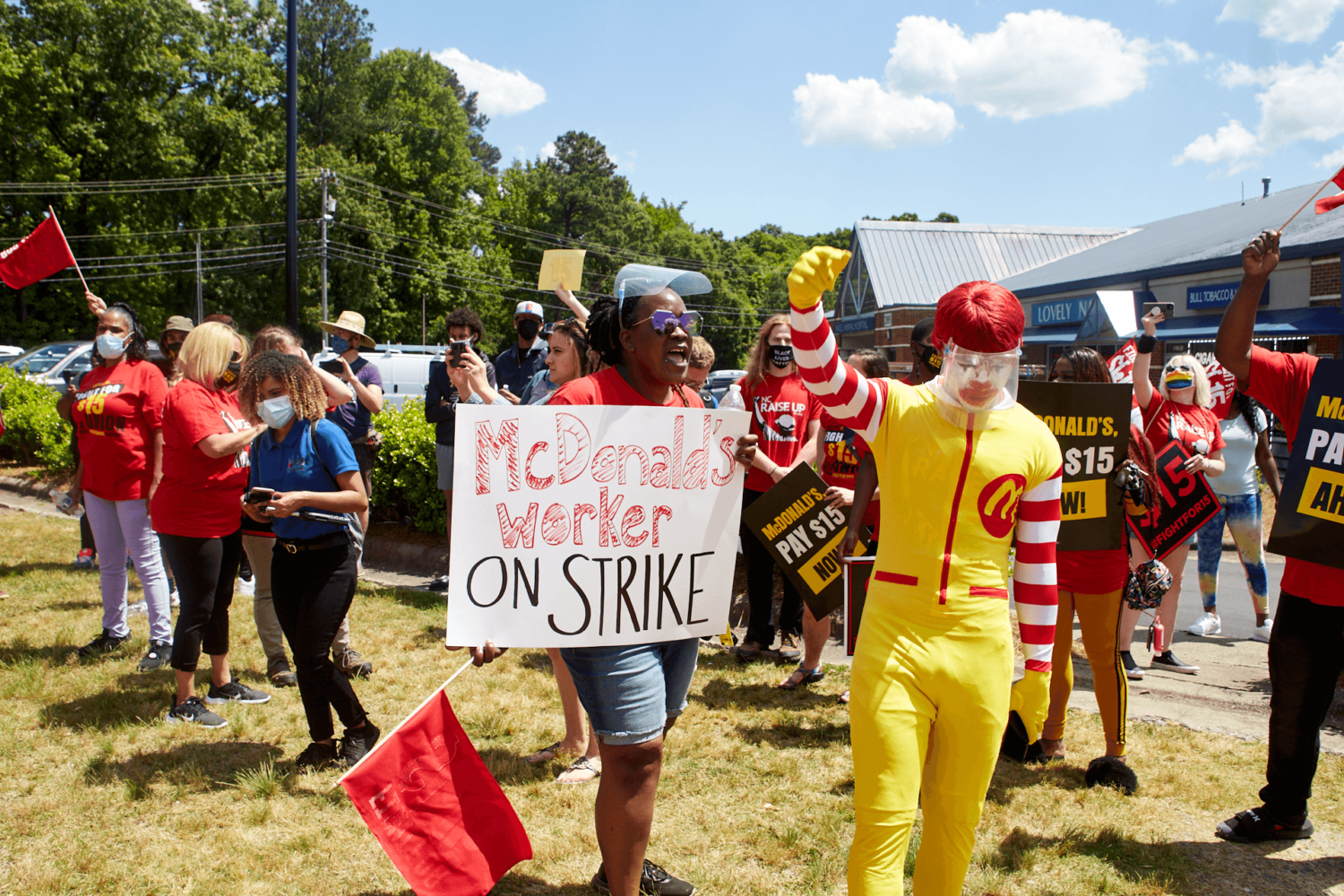
Photo courtesy of Precious Cole
The state is facing an employee-led reckoning in the restaurant industry—and workers say they’re at a breaking point.
From fast food chains to mid-level eateries to high-end bistros, restaurants are reportedly having trouble luring workers back into the industry after a year of unprecedented upheaval. The so-called labor shortage has reached “crisis” levels, according to the U.S. Chamber of Commerce, but recent numbers released by the Department of Labor paint a more hopeful picture.
Pictured above: Precious Cole demonstrates at a McDonald’s worker strike in Durham, North Carolina.
The unemployment rate is under 6 percent for the first time since March 2020. While the hospitality industry is still struggling to bounce back, 343,000 jobs were added last month, accounting for 40 percent of the employment gains in June. Still, a persistent narrative remains: Restaurants are experiencing a labor shortage because Americans are choosing to remain unemployed, living off stimulus checks and exploiting enhanced pandemic-related benefits. This convenient fiction is so pervasive that 27 states, mostly led by Republicans, are withdrawing from federal jobless assistance programs months ahead of September 6 (when state benefits for the long-term unemployed are also set to expire). The decision to withdraw from these programs will impact millions of Americans.
Still, a persistent narrative remains: Restaurants are experiencing a labor shortage because Americans are choosing to remain unemployed, living off stimulus checks and exploiting enhanced pandemic-related benefits.
Restaurants appear confused as to how to entice workers back to the industry. Rather than raising wages, for example, some are doling out one-time hiring bonuses or offering free appetizers at job interviews in an effort to bring workers back into the fold. Meanwhile, a survey released in May reported that an estimated 75 percent of workers said they considered leaving the restaurant industry because of low wages and tips.
In all of this hand-wringing about the labor shortage, restaurant workers’ own voices are rarely centered—especially in the South, where state legislatures routinely fail to invest in public services or pass pro-worker laws, creating an inhospitable environment for the low-wage workforce. But workers are fighting these conditions.
Though North Carolina has a long anti-union history, it’s also home to NC Raise Up, a very active branch of the Fight for $15 and a Union—an advocacy organization demanding that corporations increase wages and that state and federal governments step in to mandate a $15 minimum wage. NC Raise Up began in 2013 and for months, fast food workers have led day-long strikes. Most recently, Durham McDonald’s workers went on strike on May 19, a day before the McDonald’s annual shareholder’s meeting. The company made more than $5 billion in profits in 2020, but did not raise wages for its frontline workers.
Durham McDonald’s workers went on strike on May 19, a day before the McDonald’s annual shareholder’s meeting. The company made more than $5 billion in profits in 2020, but did not raise wages for its frontline workers.
The Counter spoke to industry workers in North Carolina about the so-called labor shortage plaguing their state and the country at-large. We wanted to know: What does the public not understand about what’s happening in the industry right now? What do they want people to know about why restaurants are struggling to find workers? Opinions varied, but a common thread tied them together: The industry is brutal and it doesn’t pay people enough to endure it.
(These comments have been edited and condensed for length and clarity.)
—
Precious Cole, 33
McDonald’s worker and NC Raise Up member, Durham, NC
If these companies want workers, they’re going to have to do better. They’re going to have to pay $15 an hour or more [or] nobody’s going to come to work. We’ve been at a breaking point since Covid hit and these companies did not do what they needed to do to protect us. I lost family members. I lost friends because of this, and [companies] can’t even have the common decency to protect the people that work for them. Now we have to deal with people who claim that they’re vaccinated and don’t have to wear a mask. Who’s to say that they are actually vaccinated?
I was recruited [by McDonald’s] for more money while working at the drive-thru at Wendy’s. I basically quit Wendy’s in the middle of the night. My mental health couldn’t take it anymore. I said, you know what? I’m tired of this B.S. We shut the store down. I left my keys and walked away with people still in the drive-thru. If they think we’re going to keep working like this just because we need jobs? No. There are other jobs out there. Without us, there are no stores. Without us, there is no company.
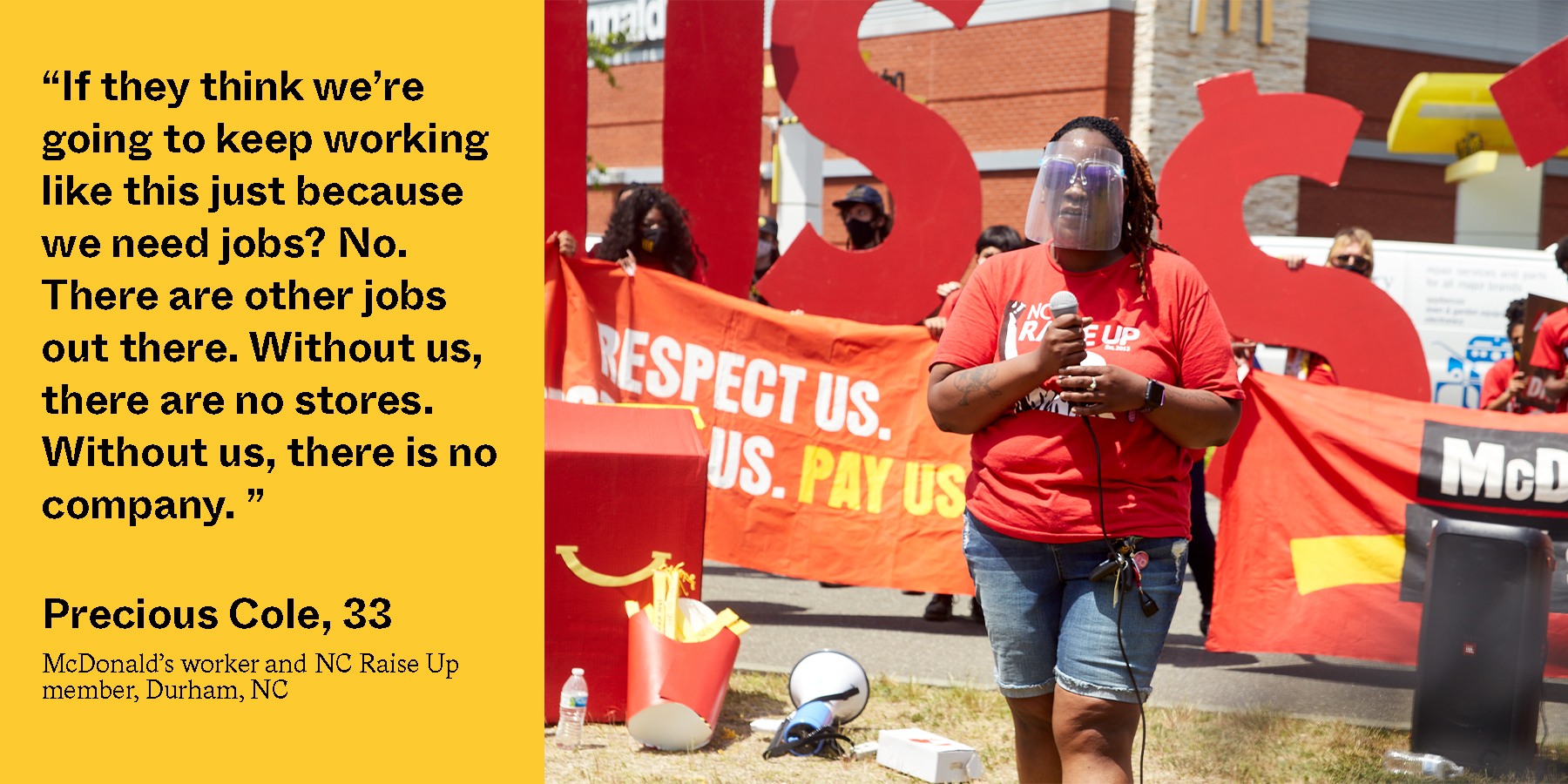
Photo courtesy of Precious Cole
If people were paid a liveable wage, they would want to work [in the industry]. Some people are making more on unemployment because these companies refuse to pay us what we deserve. We’re the ones who have been working through the pandemic. We’re the ones putting our families’ lives on the line. There are people working at McDonald’s making $9 an hour. Are you serious with that? We’re not going to deal with this anymore. They need to make a decision: Either they pay us more, or they lose their whole company. Point blank.
Jamiee Weaver, 41
Bartender/server, Winston Salem, NC
The thing about the ‘labor shortage’ is that there has always been a lot of turnover in this industry, but honestly—mostly because of Covid—a lot of people have moved on. They either left because they didn’t have a job for a year or they’re just tired of working in the industry. In this business, you work nights, you work weekends, you don’t get holidays off. You’re living paycheck-to-paycheck. There are no benefits. People come to work sick because if they miss a shift, they don’t pay a bill. The people who think we don’t want to work and are just living off of a few stimulus checks are the same people who wanted to re-open everything during the pandemic and who didn’t want to wear masks. We were risking our lives so people could eat out and they still treated us like garbage and didn’t tip. This has been gut-wrenching in every way possible—and the people who survived it are now getting raked over the coals because restaurants are so short staffed.
Something has to give. People want everything fast and they want everything cheap. Profit margins really are razor-thin in restaurants, but people deserve to make a liveable wage. Restaurants say they can’t afford to pay more. So, prices may need to go way up and customers need to understand how expensive it actually is to have someone prepare your food and have a staff to bring it to you. If you don’t want to spend the money to have people do all of these things for you and get paid a liveable wage, then maybe don’t eat out.
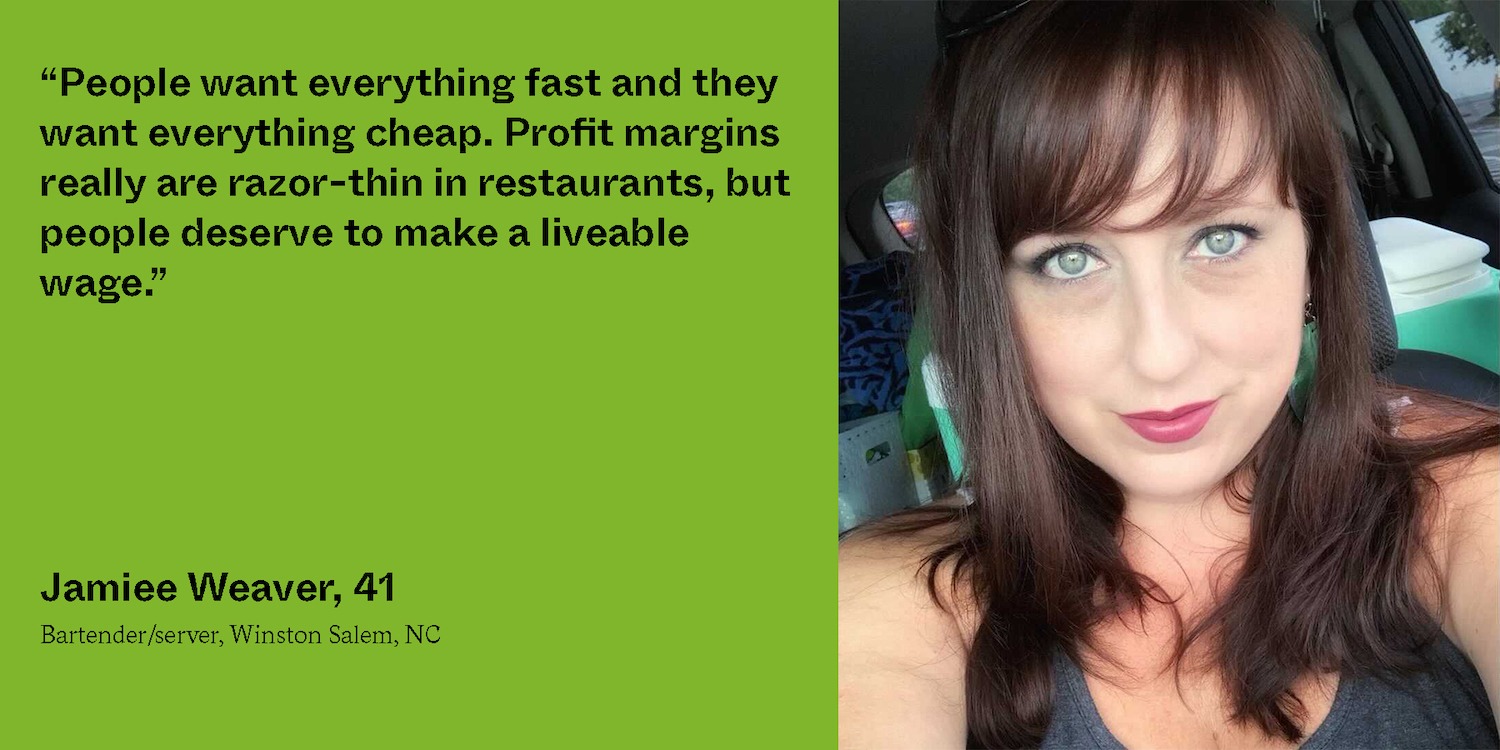
Photo courtesy of Jaimee Weaver
If we ever do get to a $15 minimum wage, prices are going to go up. I also suspect that outside of fine dining, things are going to become more mechanized. You’ll order from a kiosk or iPad and maybe the restaurant pays one person to clean tables or bring out drinks, so there won’t be a waitstaff. The options, as far as I see it, are for people to pay more for food so that we can actually take care of employees, or restaurants are going to go further into the model where everything is automated or more focused on ordering online.
I worked in the industry for more than 20 years. Now that I’ve had a minute to breathe, I realize it’s really traumatizing work. I was a general manager for five years and it felt like it stole my soul. It’s non-stop, 24/7. You can’t take time off. You’re always on call, anytime anything goes wrong. It feels like a crushing weight. When you’re in it, you can’t see how broken the industry is. It’s like being in an abusive relationship. It’s physically brutal and emotionally exhausting, and there’s this constant fear and insecurity about how you’re going to make ends meet. That’s why it’s so upsetting to see all of this stuff about how there’s a labor shortage because people are lazy and just want to sit at home and collect checks.
You think this is such a great industry to work in? Shut up, put a fucking apron on, and go work one of these jobs and see how it feels to work for pennies.
Ebony Warfield, 30
Chef, Winston Salem, NC
You have to understand: This was an industry we always thought was going to be here because people have to eat, right? A lot of people thought they would always have a job. But then Covid hit and these jobs weren’t there. A lot of people left and never came back. I can understand not coming back, but this is my passion. I live and breathe food, so nothing would have kept me away. But there have been challenges.
Customers wanted everything to instantly ‘go back to normal’ and for the people in the industry who stuck around, that was really hard. They felt abused. Customers maybe don’t understand the unique challenges in the front of the house. People in the front-of-house are working doubles, back-to-back, because there’s a shortage. They’re working these long hours, they’re exhausted, and they’re getting beat down by customers when the restaurant is short-staffed and they have double the workload. People are just burnt out. Customers who have not been in the industry don’t understand what it’s like to be on your fifth double shift.
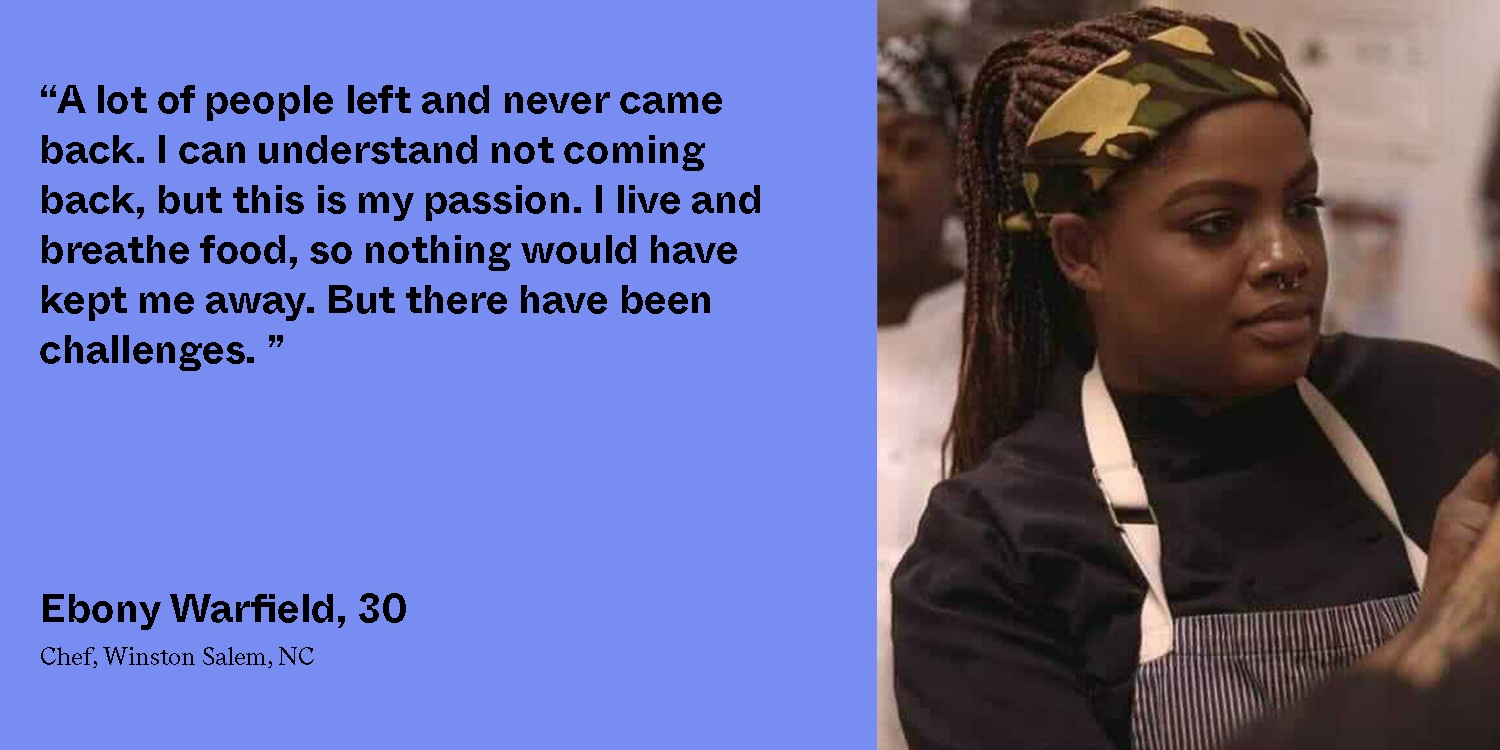
Photo courtesy of Ebony Warfield
Right now a lot of businesses are opening back up, and I see both sides of things. It’s not as easy as, ‘We want to pay workers well.’ Bills have to be paid. Food has to be ordered. You have to think about every little thing—aprons and tablecloths and napkins and cups. All of these things have to be purchased, and people don’t take that into consideration when talking about wages. But I have also been a non-salaried worker when I was doing twice the amount of work because there was a shortage; my pay didn’t reflect the work I was doing. I understand the math some people might do. If you can get $600 a week in unemployment, or go back to work to do double or triple the amount of work for way less? I get it.
I just want people to understand a few things. If you see someone working in a restaurant right now, it’s either because they love it or they’re committed to it. They’re trying their hardest to the best of their capacity. Working in kitchens is a skill, so we need people who have those skills and who are motivated and dedicated to work in a hard environment.
Crissy Faison, 37
Chef and owner of LeanBack Soul Food Catering, Co. Winston Salem, NC
This ‘labor shortage’ is complicated because it’s not like people aren’t going back to work—they’re just maybe not going back to work in the restaurant industry. I have friends who lost their jobs in the service industry or had their hours cut way back; now they do work that has nothing to do with food. They make good money and some even seem happier.
I hear a lot of people saying that [workers aren’t] coming back because they’re making more on unemployment. That says something sad about the industry. When unemployment runs out in North Carolina, maybe people will run back to work in the restaurant industry. But they’ll get paid a few dollars an hour and live off tips. Personally, I could never live like that. I couldn’t gamble my security on tips.
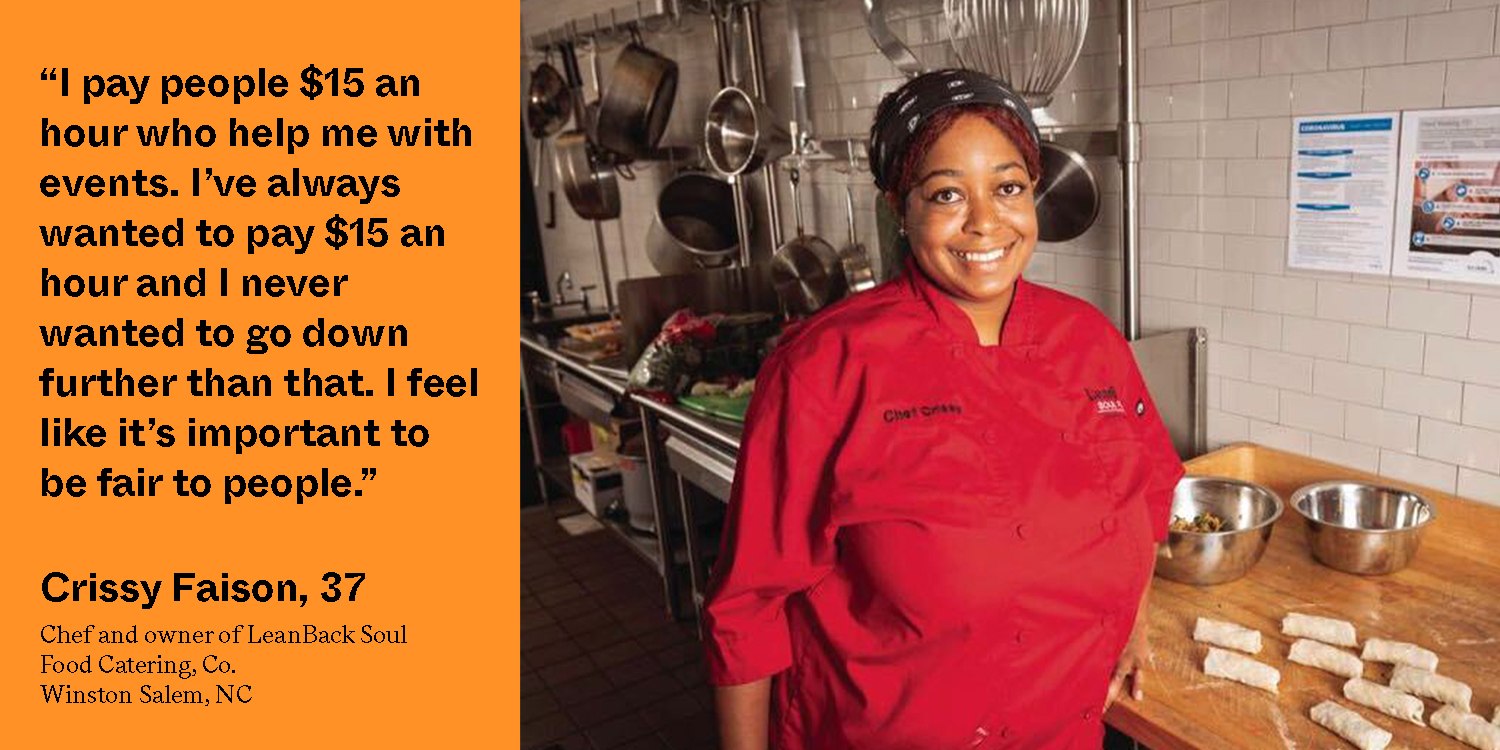
Photo courtesy of Chrissy Faison
As a caterer I don’t have employees, but I pay people $15 an hour who help me with events. I’ve always wanted to pay $15 an hour and I never wanted to go down further than that. I feel like it’s important to be fair to people. I can’t speak for other people, but if I move up in life I want other people to be able to move up in life too. If I can afford to pay someone $15, why wouldn’t I?
I have no problem finding people who want to work. People have been waiting; when things started to pick back up, all I had to do was pick up the phone. It might have something to do with what I pay or how I treat people, but I haven’t offered anyone work who said no. I know the restaurant industry is different [from catering] and things are really hard right now, and I see a lot of negativity about service. People are saying nasty things online and leaving bad reviews. If you’re going to be an asshole to people, just stay home.
Keenan Harton, 46
Former fast food worker and member of NC Raise Up, Durham, NC
I’ve worked in fast food since I was a teenager. When Covid started I was working at Biscuitville for $8 an hour. Then Biscuitville cut my hours back more and I finally got cut from the job. They rehired me a few months ago and only gave me a 50-cent raise, but I quit because the working conditions were bad and it’s basically not worth it. Now I work as a handyman.
I don’t understand why they say there’s a labor shortage. I actually don’t believe there’s a shortage; I believe people are tired. I’m fed up and fired up about the way these companies treat workers. If these restaurants would actually pay us a liveable wage, they wouldn’t have to worry about trying to find workers. This work is hard. You work 10-, 12-hour shifts. You come home and your body hurts. Maybe you have health conditions. Maybe there is family or other stuff you have to deal with when you get home, and you still have to work another job or do work on the side just to cover your bills. It’s really tough out here. These companies wouldn’t be able to make millions of dollars if we weren’t working for them.
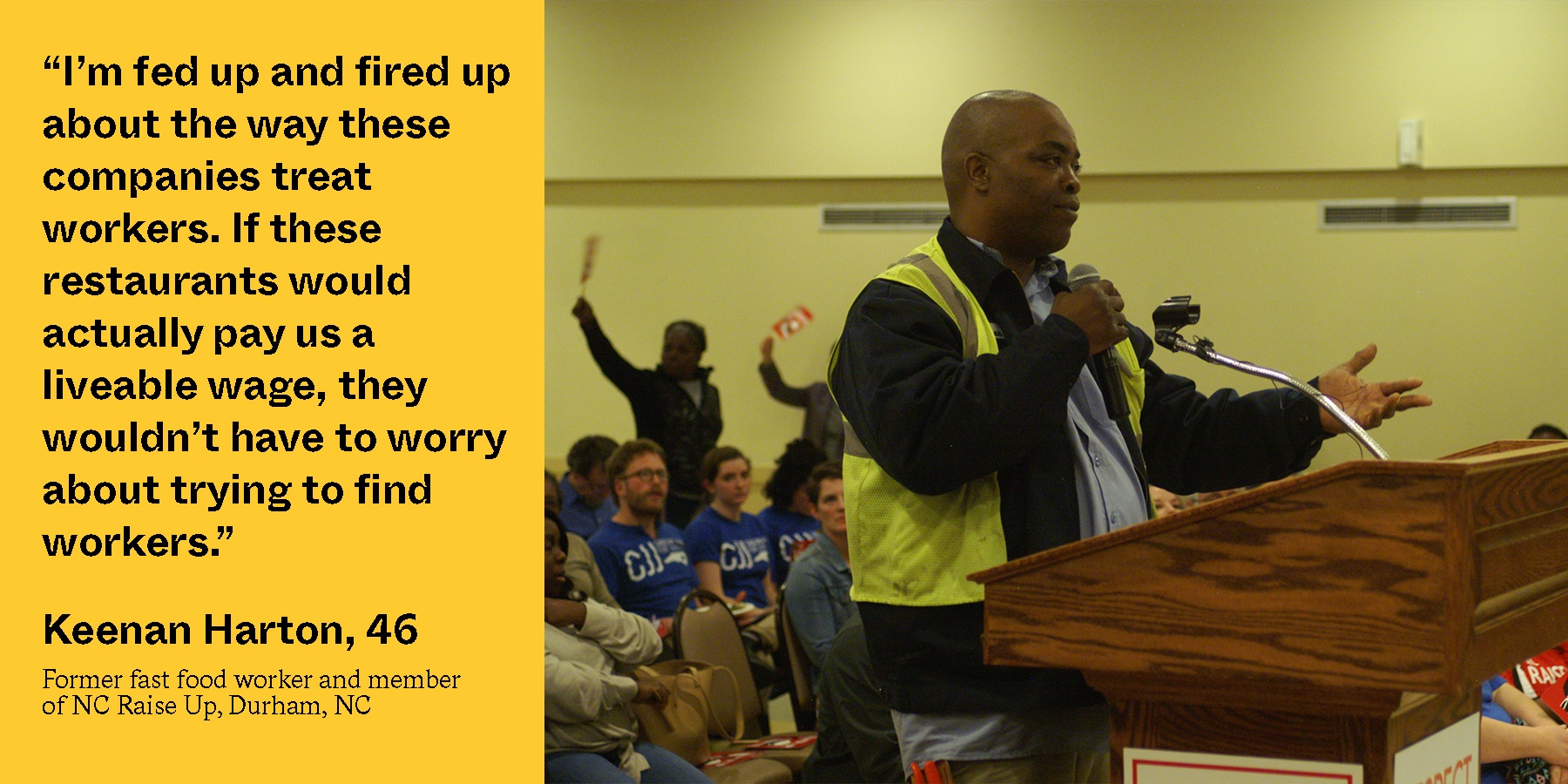
Photo courtesy of Keenan Harton
The community is fed up. We have felt like this for years, but you throw Covid in the mix and it’s become chaotic. No one is living off of their stimulus checks. It wasn’t even enough to take care of your bills. Covid left all of us in a [financial] hole, so by the time we got those checks we were already two or three months behind on bills. This is what I mean when I say that people are tired: They are tired of making a $7.25 minimum wage that they can’t even live off of. People have had to move out of their homes and their neighborhoods while the rich keep getting richer. I want fairness. I want equality. I want these corporations to take a look at what’s really going on and what their role is before they start running with this story about labor shortages and how no one wants to work.
I want reporters to do their homework. Look at how much fast food CEOs make a year and how much we make a year when we’re the ones doing the work. Is it really that confusing why people don’t want to take fast food jobs anymore? Ask these fast food companies why they won’t pay their workers a decent living wage. I would be asking all of these questions. Ask a CEO to work for $7.25 an hour and see what happens.
Jorge Ruiz, 28
Chef, Durham, NC
The restaurant industry is very intensive and I understand people who decided it’s just not worth it. I’ve felt that before. When I graduated from the Culinary Institute of America, the top culinary school in the country, I had a huge amount of school debt. My first job [after graduation] was as a line cook making $10 an hour. It was a very hard way to live. Most months I had to skip paying certain bills. I can’t imagine raising a family on that, which is what a lot of people have to do. Even if you know your worth, there are very thin profit margins in the restaurant industry, and that’s used as an excuse for restaurants to get the most out of someone for the least amount.
I really hope that one day soon we see better pay and more fairness for employees. Just asking for a sick day is hard. Wages need to increase, but there also has to be work-life balance. I’ve been offered very low salaries with the requirement that I work six days a week. You never see your family. There’s also a lot of toxic stuff. The angry chef mentality is real. You get yelled at and nothing’s ever good enough. That’s just common practice in high-end restaurants. I’m only 28, but I already feel old. This work destroys your body. You’re working long hours in these really hard environments and your mental health starts to suffer. This was already a hard industry, but then you add Covid and it’s not surprising people don’t want to come back.
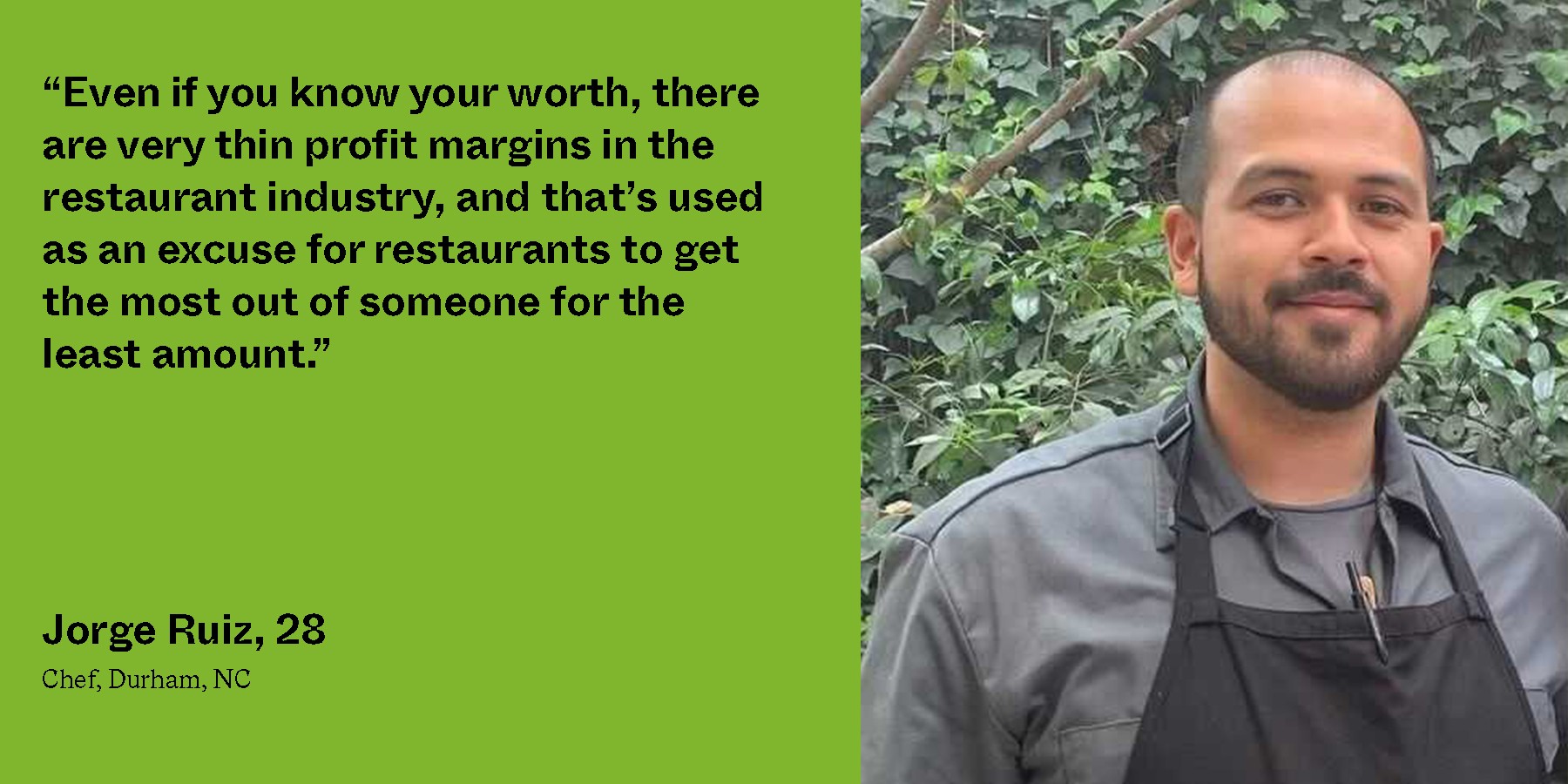
Photo courtesy of Jorge Ruiz
It’s crazy that people think the restaurant industry can’t find employees because people are still living off $3,200 in stimulus checks. The unemployment thing might be different. If someone made more on unemployment than they did working, you know what? Good for them. I really hope it helped them out. Making the same amount of money on unemployment as you make working 60 hours a week is nice. I hope people were able to relax a little bit, breathe, and not have to worry so much. I hope they were able to focus on other things, like their mental health or their families.
Nahshon Blount, 21
McDonald’s worker and NC Raise Up member, Durham, NC
I started working at McDonald’s when Covid was the worst. It was hard. I was on the frontlines, and you start to realize you could die just doing your job. I decided to participate in the [May 19] strike because I knew McDonald’s was having its shareholders meeting, which is where millionaires and billionaires come together to discuss how their profits are going to be distributed. McDonald’s doesn’t use its money for what is really needed. I want them to give workers raises.
It’s scary to go on strike and to speak out, but the way I see it: I’m speaking for everybody. I’m speaking for the people who can’t speak for themselves. The reason people don’t want to work right now is because there’s a wage shortage. No one wants to work for such a low amount of money—$8.50 an hour is nothing. That’s not enough to pay your bills and rents here are getting higher and higher. For me, being able to provide for my family, put food on the table, and actually pay rent is a really big challenge. I have to always depend on my family to help me—even when I work doubles. We’re not even supposed to be doing a lot of doubles, so I just be sneaking doubles.
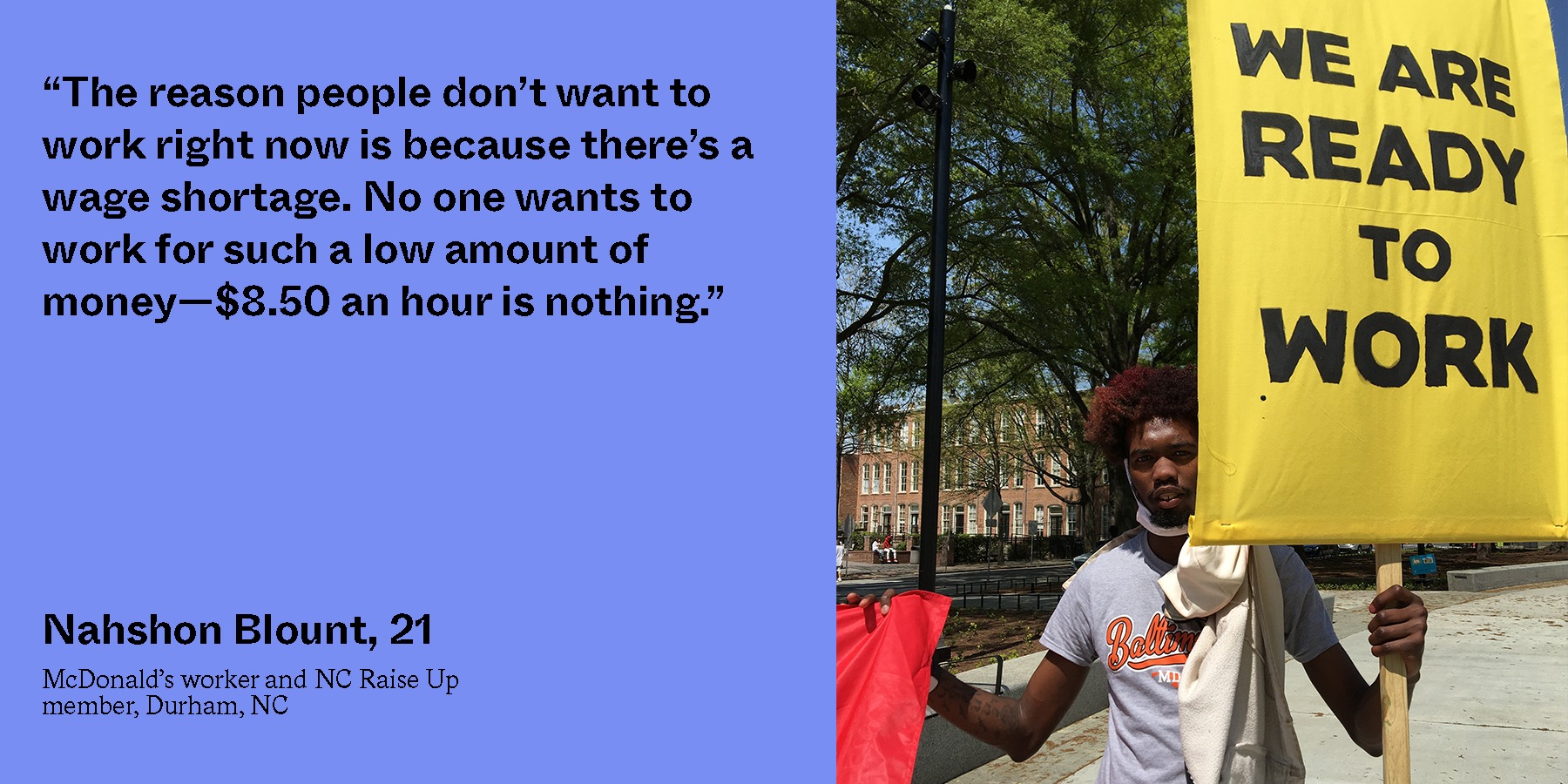
Photo courtesy of Nahshon Blount
People forget that we’re still on the frontlines of Covid. [In our state,] it’s gone up and down. People had to wear a mask and then they didn’t, and we don’t know if people have really been vaccinated. It throws me off to see people not wearing masks. I know the government said they don’t have to anymore, but I really just don’t want to deal with it. Personally, I don’t really want to keep putting myself out there like that on the frontlines—especially for such a small amount of money. When we’re closing, we deal with people banging on the doors for us to take their orders. I’ve been through the craziest days at McDonald’s.
I’m doing double the amount of work I should be doing. If people don’t come in when they’re supposed to when I have my day off, they call and try to make me come in. They threaten to fire you if you don’t go in. My health is more important than a job. People question us when we strike or protest or just decide we don’t want to work at these places anymore. They say, ‘Why do you act that way?’ Or they say, ‘You’re just being lazy.’ But look at how they treat us. They don’t treat us with any respect or dignity. They don’t pay us enough to live. That’s why I don’t blame people for not wanting these jobs.

